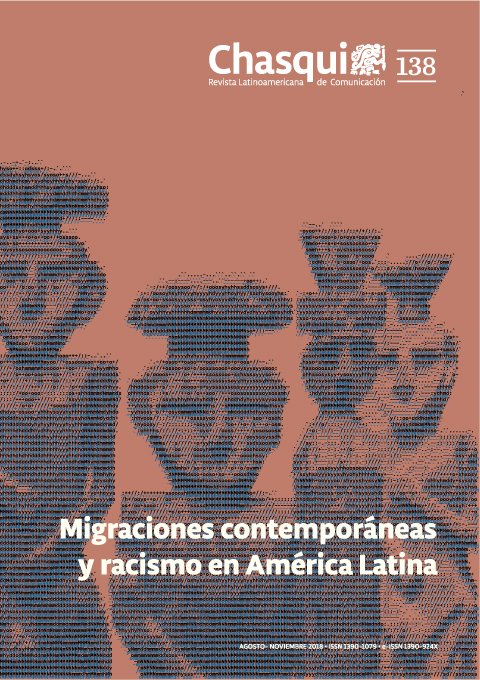Social media and production of subjectivities: subversions of non-binary people through Twitter
DOI:
https://doi.org/10.16921/chasqui.v0i138.3174Keywords:
subjectivity, singularization, non-binary subjects, subversion, TwitterAbstract
This article investigates the processes of creation of subjectivity, singularization and subversion engendered by the use of non-binary self-declared people of the hashtag #whatgenderqueerlookslike on Twitter. Through the articulation between studies on the digital media, Queer Theory and Deleuze and Guattari's theorizations about subjectivity, it was observed that there was an empowering appropriation of the social network by the non-binary subjects, who could manifest through the internet their rhizomatic subjectivity and singularization, as well as their subversions, within the performativity, that provoke tensions in the social patterns that define the linear connection between sex, gender and desire.References
Altmayer, C. (2016). Tropicuir: (Re)existências políticas nas ações performáticas de corpos transviados no Rio de Janeiro. Dissertação (Mestrado) - Curso de Pós Graduação em Design, PUC-Rio, Rio de Janeiro.
Butler, J. (2003). Problemas de Gênero: Feminismo e subversão da identidade. Rio de Janeiro: Civilização Brasileira.
Butler, J. (2016). Rethinking Vulnerability and Resistance. In: Butler, J., Gambetti, Z. & Sabsay, L. (ed). Vulnerability in Resistance. Durham and London: Duke University Press, 2016.
Deleuze, G. & Guattari F. (1995) Mil Platôs: Capitalismo e Esquizofrenia. v. 1. São Paulo: Editora 34.
Ferreira Neto, J. L. (2015). Micropolítica em Mil Platôs: uma leitura. Psicologia USP, 26(3): 397-406
Foucault, M. (1993). A história da sexualidade 1: a vontade de saber. Rio de Janeiro: Graal.
Gonçalves, E. M. & Silva, M. (2014) A amplitude do diálogo nas redes sociais digitais: sentidos em construção. En Goulart, E. (Ed.). Mídias Sociais: uma contribuição de análise. Porto Alegre: Edipucrs.
Guattari, F. (1992). Caosmose: um novo paradigma estético. São Paulo: Editora 34.
Guattari, F & Rolnik, S. (1996). Micropolítica: cartografias do desejo. Petrópolis: Vozes.
Louro, G. (2004). Um Corpo Estranho: Ensaios Sobre Sexualidade e Teoria Queer. Belo Horizonte: Autêntica.
Miranda, L. & Soares, L. (2009). Produzir subjetividades: o que significa? Estudos e Pesquisas em Psicologia. 2 (9), 408-424.
Miskolci, R. (2009). A Teoria Queer e a Sociologia: o desafio de uma analítica da normalização. Sociologias 11(21), 150-182.
Parpinelli, R. & Fabiano, L. (2007). Considerações sobre a subjetividade e sua relação com o singular e com a saúde mental. En: XIV Encontro Nacional da Abrapso, 2007
Preciado, P. B. (2011). Multidões queer: notas para uma política dos “anormais”. Rev.Estudos Feministas, 19(1), 11-20
Recuero, R. (2009). Redes Sociais na Internet. Porto Alegre: Sulina.
Recuero, R & Zago, G. (2010). “RT, por favor”: considerações sobre a difusão de informações no Twitter. Fronteiras – Estudos Midiáticos. 12(2), 69-81.
Silva, A. (2014). Currículo e diferença: cartografia de um corpo travesti. Tese (Doutorado) - Curso de Pós Graduação em Educação, UFPel, Pelotas.
Nicholson, L. (2000). Interpretando o Gênero. Estudos Feministas, 8(2), 1-33.
Scott, J. (1995). Gênero: uma categoria útil de análise histórica. Educação e Realidade, 2(20), 71-99
Haraway, D. (2004). “Gênero” para um dicionário marxista: a política sexual de uma palavra. Cadernos Pagu, 22(1): 201-246.
Downloads
Published
Issue
Section
License
- Authors retain copyright and grant the journal right of first publication with the work simultaneously licensed under a Creative Commons Attribution-NoDerivs License (CC BY-ND) that allows others to share the work with an acknowledgement of the work's authorship and initial publication in this journal.
- Authors are able to enter into separate, additional contractual arrangements for the non-exclusive distribution of the journal's published version of the work (e.g., post it to an institutional repository or publish it in a book), with an acknowledgement of its initial publication in this journal.
- Authors are permitted and encouraged to post their work online.

